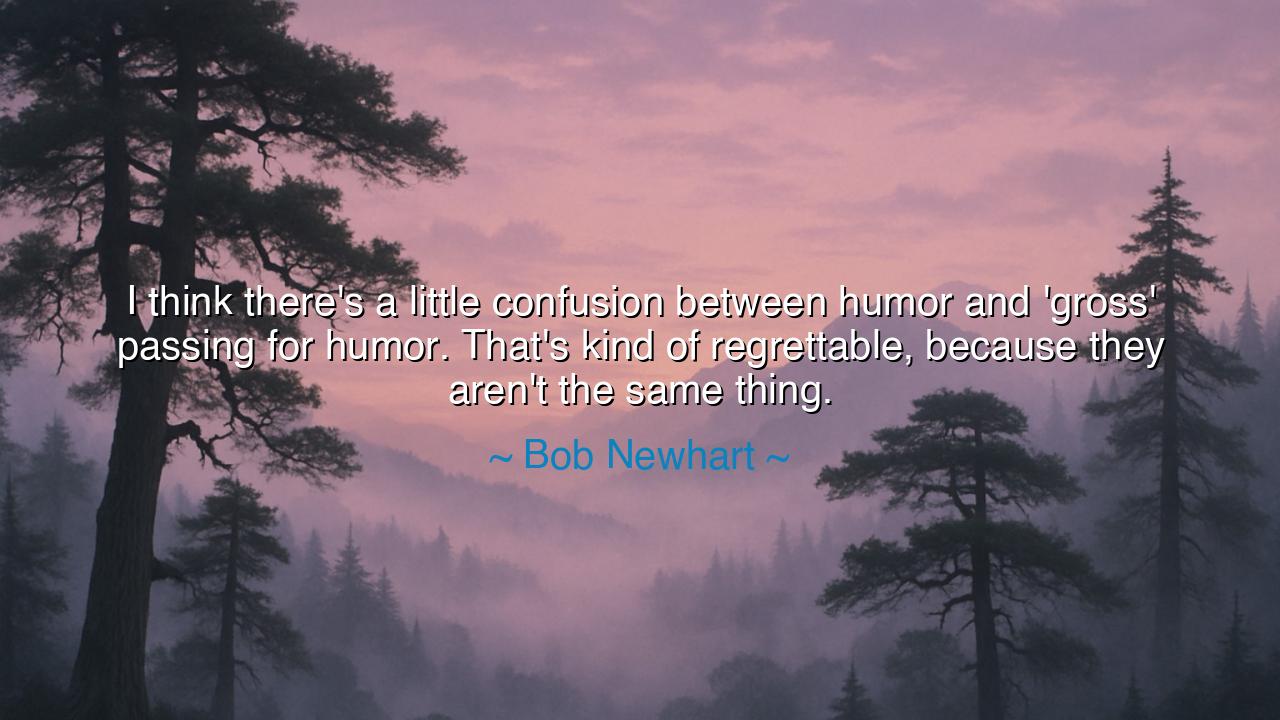
I think there's a little confusion between humor and 'gross'
I think there's a little confusion between humor and 'gross' passing for humor. That's kind of regrettable, because they aren't the same thing.






When Bob Newhart said, “I think there’s a little confusion between humor and ‘gross’ passing for humor. That’s kind of regrettable, because they aren’t the same thing,” he spoke as a guardian of a vanishing art — the art of true humor. His words, though simple in tone, carry the gravity of wisdom refined through decades of performance, reflection, and human understanding. For Newhart, laughter was never a weapon, nor a noise born of shock. It was an expression of insight, grace, and shared humanity. In his lament, we hear not scorn, but sorrow — sorrow that modern culture often mistakes vulgarity for courage, and crudeness for creativity.
The meaning of his words lies in the timeless distinction between wit and vulgarity, between the laughter that uplifts and the laughter that degrades. True humor is the laughter of recognition — the moment when we see our own follies mirrored in another and smile, not out of cruelty, but out of compassion. It requires thought, empathy, and timing; it arises from truth observed, not shock delivered. Grossness, on the other hand, is the counterfeit of humor. It aims not to illuminate, but to provoke; not to unite, but to jolt. It seeks the laugh that bursts without reflection, the reaction that fades without meaning. Bob Newhart, in his clarity, reminds us that laughter without wisdom is like music without melody — noise that satisfies for a moment but leaves the soul empty.
In the ancient world, humor was revered as a teacher of humility. The philosopher Aristotle wrote that laughter was the mark of humanity — for to laugh is to recognize one’s own imperfection. Yet, he warned that true humor should never humiliate, but reveal. Even the great Socrates, whose wit disarmed the proud and awakened the sleeping mind, used laughter not to insult, but to inspire. The jest, for the wise, was a vessel for truth. Newhart’s observation belongs to this same lineage of thought. His gentle, deliberate humor — never coarse, never cruel — was a reflection of intelligence and restraint. It showed that laughter, when shaped by empathy, becomes a form of enlightenment.
Consider the example of Charlie Chaplin, the silent poet of cinema. In an age of hardship and despair, Chaplin made the world laugh without uttering a vulgar word. His humor came not from crudeness, but from truth — from the sight of the little man struggling against the vast machinery of life. In his film Modern Times, Chaplin’s tramp gets swallowed by gears, yet continues to smile; we laugh, and in that laughter, we recognize ourselves. That is the power of true humor: it transforms suffering into understanding. It reminds us that even amid absurdity, dignity remains. Grossness could never achieve this — it merely ridicules where true humor redeems.
Bob Newhart’s own style of comedy was a masterclass in subtlety and intelligence. He built entire worlds out of silence and timing, crafting laughter not from shock, but from shared recognition. His monologues, filled with awkward pauses and understated absurdities, invited audiences to think — to see the humor hidden within the ordinary. He trusted the audience’s intelligence, never pandering to the cheap or the crude. In a time when comedy began to lean toward the outrageous, Newhart stood as a quiet voice of integrity. His humor, like fine craftsmanship, was carved with care. And in doing so, he proved that laughter born of restraint often lasts longer than laughter born of rebellion.
To confuse grossness with humor is to lose respect for the sacredness of laughter. For laughter, in its purest form, is medicine for the human spirit. It heals divisions, lightens burdens, and draws strangers together in a single moment of joy. But when laughter is corrupted by vulgarity, it ceases to heal — it wounds. It becomes a tool for alienation rather than connection. The ancients knew this too: the Roman playwright Terence once said, “I am human; nothing human is alien to me.” This is the essence of true comedy — to laugh because we understand, not because we despise.
So, my listener, take this lesson as both warning and guidance: choose your laughter wisely. Let your humor reveal, not conceal; let it build, not destroy. When you speak in jest, ask yourself — does my laughter bring light, or does it cast shadow? True humor needs no vulgarity to be strong, and no cruelty to be sharp. It thrives in grace, in thought, and in truth. Seek laughter that ennobles, for such laughter makes the heart wiser.
In the end, Bob Newhart’s words remind us that humor, at its highest form, is a moral act — an expression of understanding and empathy. It is not found in the gutter, but in the mirror, where we see our shared absurdities reflected back at us with gentleness and love. Be the kind of person who, like Newhart, makes others laugh without lowering them. Let your humor be a bridge, not a blade; a light in the darkness, not a flame that burns. For laughter, when used well, is not only the sound of joy — it is the sound of wisdom made human.






AAdministratorAdministrator
Welcome, honored guests. Please leave a comment, we will respond soon